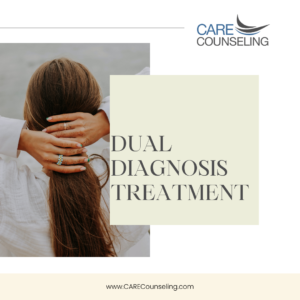Dual Diagnosis Treatment
 Imagine trying to juggle two balls simultaneously—one represents a substance use disorder (SUD), and the other, a mental health condition (MHC). This intricate balancing act is the daily reality for individuals with dual diagnosis, where they grapple with both addiction and mental health challenges. Let’s dive into the complexities of dual diagnosis, explore the importance of integrated treatment, and discuss the unique challenges it presents.
Imagine trying to juggle two balls simultaneously—one represents a substance use disorder (SUD), and the other, a mental health condition (MHC). This intricate balancing act is the daily reality for individuals with dual diagnosis, where they grapple with both addiction and mental health challenges. Let’s dive into the complexities of dual diagnosis, explore the importance of integrated treatment, and discuss the unique challenges it presents.
Understanding Dual Diagnosis
Dual diagnosis, also known as co-occurring disorders, occurs when an individual is simultaneously dealing with a substance use disorder and a mental health condition. It’s not uncommon for these two issues to be interconnected, with one exacerbating the other. For example, someone struggling with depression may turn to drugs or alcohol to self-medicate, which can lead to addiction.
The Complexity of Co-Occurring Disorders
- Mutual Reinforcement: Substance abuse and mental health disorders often feed off each other. Individuals may use substances to alleviate the symptoms of their mental health condition, and in turn, substance use can worsen their mental health symptoms. This vicious cycle can make recovery particularly challenging.
- Varied Symptoms: Co-occurring disorders can present with a wide range of symptoms, making diagnosis and treatment planning more complex. Symptoms can overlap or mask each other, making it difficult to pinpoint the root causes of an individual’s struggles.
- Stigma: The stigma surrounding mental health and addiction can be especially pronounced for individuals with dual diagnosis. They may feel judged or misunderstood by both the mental health and addiction treatment communities, leading to feelings of isolation and hopelessness.
The Importance of Integrated Treatment
Integrated treatment is a comprehensive approach that addresses both the substance use disorder and the mental health condition simultaneously. Here’s why integrated treatment is vital for individuals with dual diagnosis:
- Holistic Care: Integrated treatment acknowledges that an individual’s substance use and mental health issues are interconnected. By addressing both simultaneously, it provides a more holistic and effective approach to recovery.
- Improved Outcomes: Research consistently shows that integrated treatment leads to better outcomes. It reduces the risk of relapse, hospitalization, and overall improvement in an individual’s quality of life.
- Tailored Solutions: Integrated treatment plans are highly individualized. They recognize that there is no one-size-fits-all approach to dual diagnosis and tailor strategies to meet each person’s unique needs.
- Accountability: Integrated treatment ensures that the individual receives consistent and coordinated care from a team of professionals, reducing the risk of falling through the cracks in the healthcare system.
Challenges in Dual Diagnosis Treatment
While integrated treatment is crucial, it comes with its own set of challenges:
- Diagnosis Delays: Identifying both the mental health condition and the substance use disorder can be challenging, and misdiagnosis or delayed diagnosis is common. This can hinder timely intervention.
- Medication Interactions: Medications used to treat mental health conditions and addiction may interact with each other, leading to complications. Close monitoring and communication between healthcare providers are essential.
- Treatment Resistance: Individuals with dual diagnosis often experience treatment resistance, where they struggle to engage in and complete treatment due to the complexity of their conditions.
- Limited Access: Access to integrated treatment programs can be limited, depending on geographic location, insurance coverage, or availability of specialized providers.
- Continuum of Care: Transitioning from acute care to ongoing support can be challenging for individuals with dual diagnosis. The need for a seamless continuum of care is crucial to prevent relapse.
Support and Hope
Despite the complexities and challenges of dual diagnosis, recovery is possible. Here are some strategies and considerations for individuals and their loved ones:
- Seek Professional Help: A qualified healthcare provider can conduct a thorough assessment to diagnose and treat both conditions. Early intervention is key.
- Build a Support System: Surround yourself with a network of understanding and supportive individuals, including friends, family, and support groups.
- Educate Yourself: Knowledge is empowering. Learn about your conditions and treatment options to make informed decisions.
- Stay Committed: Recovery is a journey with its ups and downs. Stay committed to your treatment plan and never lose hope.
- Advocate for Yourself: Don’t be afraid to advocate for your needs within the healthcare system. Communication and self-advocacy can lead to better care.
Dual diagnosis is a challenging and complex aspect of mental health and addiction treatment. It requires a comprehensive and integrated approach that recognizes the interplay between substance use and mental health disorders. While it may be difficult, recovery is possible with the right support, treatment, and determination.



























